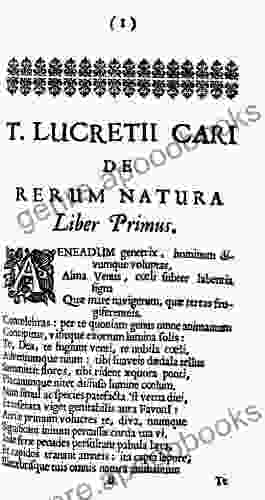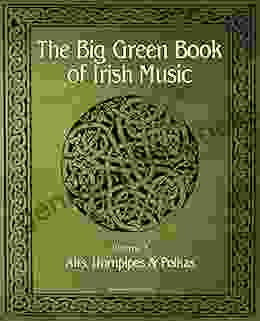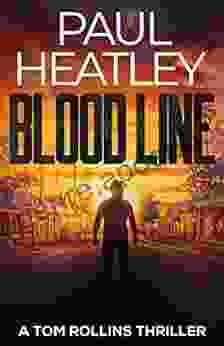De Rerum Natura: On the Nature of Things

By Titus Lucretius Carus
De Rerum Natura (On the Nature of Things) is a philosophical poem written by the Roman poet Lucretius in the 1st century BC. It is one of the most important works of ancient philosophy and science, and has been influential in the development of Western thought.
4.2 out of 5
| Language | : | English |
| File size | : | 369 KB |
| Text-to-Speech | : | Enabled |
| Screen Reader | : | Supported |
| Enhanced typesetting | : | Enabled |
| Word Wise | : | Enabled |
| Print length | : | 230 pages |
| Lending | : | Enabled |
The poem is a didactic work, intended to teach the reader about the nature of the universe. Lucretius argues that the universe is made up of atoms and void, and that all natural phenomena can be explained by the interactions of these two elements. He also argues that the gods do not exist, and that death is the end of consciousness.
De Rerum Natura is a complex and challenging work, but it is also a beautiful and inspiring one. Lucretius's passion for his subject is evident on every page, and his writing is often lyrical and evocative. The poem is a testament to the power of human reason, and it offers a unique perspective on the nature of reality.
Table of Contents
- Book 1: The Nature of the Universe
- Book 2: The Motion of Atoms
- Book 3: The Mind and the Soul
- Book 4: The Senses
- Book 5: The Origins of the World
- Book 6: The Causes of Natural Phenomena
Book 1: The Nature of the Universe
In Book 1, Lucretius introduces his main philosophical ideas. He argues that the universe is made up of atoms and void, and that all natural phenomena can be explained by the interactions of these two elements. He also argues that the gods do not exist, and that death is the end of consciousness.
Lucretius begins by invoking the goddess Venus, who he sees as the embodiment of nature. He then goes on to explain his atomic theory. He argues that atoms are the smallest possible particles of matter, and that they are indestructible and unchangeable. He also argues that atoms are in constant motion, and that their interactions with each other give rise to all the phenomena that we observe in the world.
Lucretius then turns his attention to the gods. He argues that the gods do not exist, and that the belief in them is simply a product of human fear and ignorance. He also argues that death is the end of consciousness, and that there is no afterlife.
Book 2: The Motion of Atoms
In Book 2, Lucretius discusses the motion of atoms. He argues that atoms are in constant motion, and that their interactions with each other give rise to all the phenomena that we observe in the world.
Lucretius begins by discussing the different types of motion. He argues that there are two basic types of motion: linear motion and rotational motion. He also discusses the concept of inertia, and he argues that atoms are always in motion unless they are acted upon by an external force.
Lucretius then goes on to discuss the interactions of atoms. He argues that atoms interact with each other through collisions. He also discusses the concept of atomic weight, and he argues that the weight of an atom determines its speed.
Book 3: The Mind and the Soul
In Book 3, Lucretius discusses the mind and the soul. He argues that the mind and the soul are made up of atoms, and that they are both mortal. He also argues that the mind is the seat of consciousness, and that the soul is responsible for our emotions.
Lucretius begins by discussing the nature of the mind. He argues that the mind is made up of atoms, and that it is located in the brain. He also argues that the mind is the seat of consciousness, and that it is responsible for our thoughts, feelings, and desires.
Lucretius then goes on to discuss the nature of the soul. He argues that the soul is made up of atoms, and that it is located throughout the body. He also argues that the soul is responsible for our emotions, and that it is the seat of our life-force.
Book 4: The Senses
In Book 4, Lucretius discusses the senses. He argues that the senses are the means by which we perceive the world around us, and that they are all based on the interactions of atoms.
Lucretius begins by discussing the sense of sight. He argues that we see objects because light particles bounce off of them and enter our eyes. He also discusses the sense of hearing, and he argues that we hear sounds because sound waves travel through the air and enter our ears.
Lucretius then goes on to discuss the senses of smell, taste, and touch. He argues that we smell objects because scent particles enter our noses, and that we taste objects because taste particles enter our mouths. He also argues that we touch objects because our skin comes into contact with them.
Book 5: The Origins of the World
In Book 5, Lucretius discusses the origins of the world. He argues that the world was created by the random collisions of atoms, and that it has evolved over time through a process of natural selection.
Lucretius begins by discussing the nature of chaos. He argues that chaos is a state of disFree Download in which atoms are constantly colliding with each other. He also argues that chaos is the
4.2 out of 5
| Language | : | English |
| File size | : | 369 KB |
| Text-to-Speech | : | Enabled |
| Screen Reader | : | Supported |
| Enhanced typesetting | : | Enabled |
| Word Wise | : | Enabled |
| Print length | : | 230 pages |
| Lending | : | Enabled |
Do you want to contribute by writing guest posts on this blog?
Please contact us and send us a resume of previous articles that you have written.
 Book
Book Novel
Novel Page
Page Chapter
Chapter Text
Text Story
Story Genre
Genre Reader
Reader Library
Library Paperback
Paperback E-book
E-book Magazine
Magazine Newspaper
Newspaper Paragraph
Paragraph Sentence
Sentence Bookmark
Bookmark Shelf
Shelf Glossary
Glossary Bibliography
Bibliography Foreword
Foreword Preface
Preface Synopsis
Synopsis Annotation
Annotation Footnote
Footnote Manuscript
Manuscript Scroll
Scroll Codex
Codex Tome
Tome Bestseller
Bestseller Classics
Classics Library card
Library card Narrative
Narrative Biography
Biography Autobiography
Autobiography Memoir
Memoir Reference
Reference Encyclopedia
Encyclopedia Lenora Worth
Lenora Worth Kimitaka Kaga
Kimitaka Kaga Shirley Rousseau Murphy
Shirley Rousseau Murphy Mazen M Sinjab
Mazen M Sinjab Peter L Bergen
Peter L Bergen Shane Dixon
Shane Dixon Mark Vernon
Mark Vernon Sebastian Mallaby
Sebastian Mallaby Robert J Nash
Robert J Nash Travis Mcgraw
Travis Mcgraw Marcel Moring
Marcel Moring Vanessa Mccausland
Vanessa Mccausland Matthew Masterson
Matthew Masterson George Reisman
George Reisman Maggie Gray
Maggie Gray Kim Moore
Kim Moore Lian Hearn
Lian Hearn Yuichi Ishikawa
Yuichi Ishikawa Michelle Bright
Michelle Bright Robyn Cairns
Robyn Cairns
Light bulbAdvertise smarter! Our strategic ad space ensures maximum exposure. Reserve your spot today!
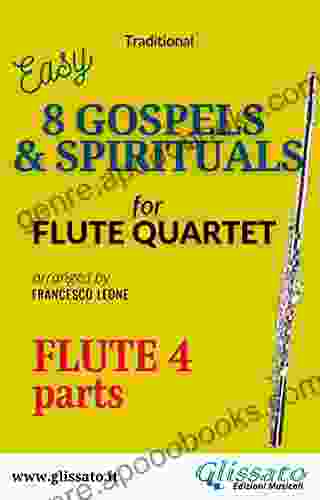
 Gabriel MistralEmbark on a Sonic Odyssey with "Easy Intermediate Gospels Spirituals For...
Gabriel MistralEmbark on a Sonic Odyssey with "Easy Intermediate Gospels Spirituals For...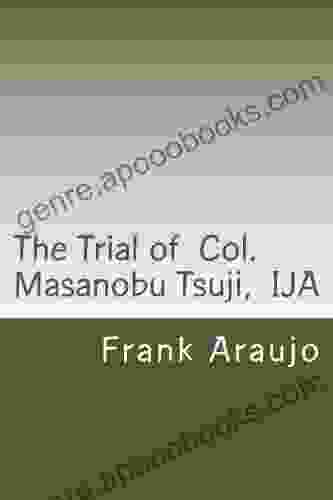
 Derrick HughesThe Trial of Colonel Masanobu Tsuji IJA: Unraveling the Intrigues of War and...
Derrick HughesThe Trial of Colonel Masanobu Tsuji IJA: Unraveling the Intrigues of War and...
 Geoffrey BlairThe Hitchhiker's Guide to Music and Dementia: A Journey Through the Power of...
Geoffrey BlairThe Hitchhiker's Guide to Music and Dementia: A Journey Through the Power of... Arthur Conan DoyleFollow ·16.8k
Arthur Conan DoyleFollow ·16.8k Drew BellFollow ·2.4k
Drew BellFollow ·2.4k Brian BellFollow ·16k
Brian BellFollow ·16k Robert FrostFollow ·15.3k
Robert FrostFollow ·15.3k Derek BellFollow ·6.1k
Derek BellFollow ·6.1k Ian MitchellFollow ·12.6k
Ian MitchellFollow ·12.6k Jaylen MitchellFollow ·8k
Jaylen MitchellFollow ·8k James JoyceFollow ·5.8k
James JoyceFollow ·5.8k

 Finn Cox
Finn CoxCarmen Suite For Flute Quartet (G Alto Flute) ( Carmen...
Experience the Magic of...

 Andy Cole
Andy ColeUncover Hidden Truths: A Comprehensive Guide to Detecting...
: The Silent...
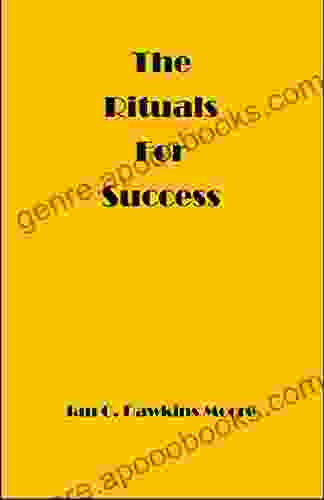
 Ken Simmons
Ken SimmonsUnleash Your Potential: Transform Frustration and...
Are you tired of feeling...
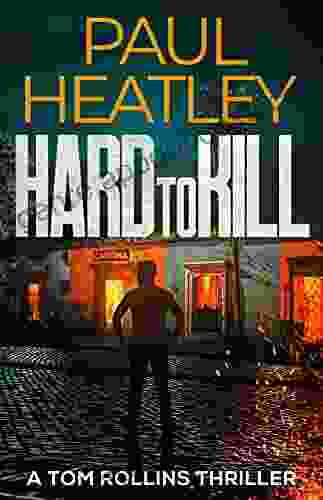
 Rick Nelson
Rick NelsonHard To Kill: A Gripping Thriller That Will Keep You on...
Tom Rollins is a...
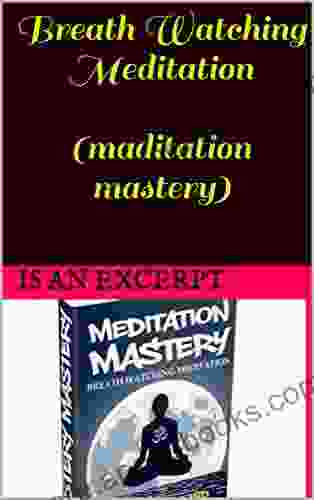
 Ivan Turner
Ivan TurnerUnleash the Power of Your Breath: Discover Breath...
In the tapestry of life, where stress and...
4.2 out of 5
| Language | : | English |
| File size | : | 369 KB |
| Text-to-Speech | : | Enabled |
| Screen Reader | : | Supported |
| Enhanced typesetting | : | Enabled |
| Word Wise | : | Enabled |
| Print length | : | 230 pages |
| Lending | : | Enabled |


